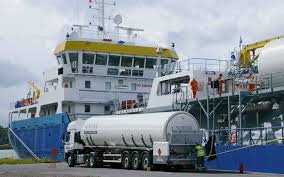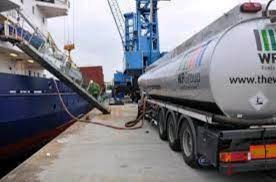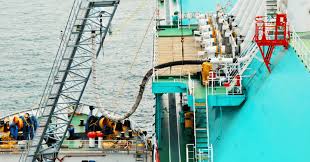![]()
If you’ve landed on this article page, you’re probably searching for a
good business idea—an idea that’s light on the pocket but heavy on
returns, promising both a fulfilling journey and potential profit.
|
How to start Bunker Fuel Trading In Nigeria
The global maritime industry relies heavily on bunker fuel to
power ships, and Nigeria, with its vast coastline and
significant ports, plays a pivotal role in this supply chain.
Bunker fuel trading in Nigeria is a complex and dynamic
business, shaped by both domestic and international factors.
Bunker fuel, sometimes simply called “bunker,” is a type of fuel
that is primarily used to power ships and other large marine
vessels. It is distinct from other fuels like gasoline or
diesel, which are designed for use in vehicles, and aviation
fuel, which is used in aircraft. Bunker fuel is much thicker and
heavier than these other fuels, which makes it suitable for use
in the massive engines of ships.
Bunker fuel is a byproduct of the crude oil refining process and
is derived from the heavy residual oils left over after the more
valuable and lighter products like gasoline, diesel, and jet
fuel have been extracted. These residual oils are typically too
thick and viscous for use in other applications and are often
referred to as “heavy fuel oil” or “HFO.”
There are several different types of bunker fuel, each with its
own specific characteristics, composition, and properties. These
types are often classified by their viscosity and sulfur
content, as these factors are critical in determining their use
and environmental impact. The most common types of bunker fuel
include:
a. Heavy Fuel Oil (HFO): Heavy Fuel Oil is the most traditional
and widely used type of bunker fuel. It is characterized by its
high viscosity and relatively high sulfur content.
HFO is the least refined and most cost-effective type of bunker
fuel, making it the fuel of choice for many shipping companies.
However, its high sulfur content has significant environmental
implications.
b. Intermediate Fuel Oil (IFO): Intermediate Fuel Oil is a
middle-ground option between Heavy Fuel Oil and cleaner fuels.
It typically has a lower sulfur content and is less viscous than
HFO. IFO is often used when there is a need for a balance
between cost-efficiency and environmental considerations.
c. Marine Gas Oil (MGO): Marine Gas Oil is a cleaner and more
refined type of bunker fuel compared to HFO and IFO. It has a
much lower sulfur content and is less viscous, making it a more
environmentally friendly choice.
MGO is often used in regions with stricter emissions regulations
or for vessels with modern engines designed to use cleaner
fuels.
d. Liquefied Natural Gas (LNG): LNG is a relatively new and
environmentally friendly option for bunker fuel. It is a
cleaner-burning alternative, as it contains significantly less
sulfur and emits fewer greenhouse gases.
LNG is gaining popularity as an eco-friendly choice for marine
propulsion, especially in regions with stringent emission
regulations.
Nigeria, with its extensive coastline and several major ports,
is a significant player in the global bunker fuel market. The
country’s bunkering operations mainly revolve around Lagos, Port
Harcourt, and Bonny Island, each of which contributes
substantially to Nigeria’s bunkering activity.
Lagos, in particular, is a bustling hub for bunker fuel trading,
given its strategic location as a major port.
The country’s involvement in the bunkering industry can be
attributed to both domestic consumption and international trade,
with numerous vessels passing through Nigerian waters.
The demand for bunker fuel in Nigeria is primarily driven by the
shipping industry, encompassing both domestic and international
vessels. Nigeria’s oil and gas sector also plays a significant
role in the country’s bunker fuel consumption, given the
presence of oil rigs and support vessels in the region.
The importance of Nigeria’s oil and gas industry in the global
energy supply chain further boosts bunker fuel trading in the
country. As a major exporter of crude oil, Nigeria’s ports are
frequently visited by tankers that require bunkering services.
The regulatory environment is a crucial aspect of the bunker
fuel trading business in Nigeria. The industry operates under
the guidance of various governmental bodies, and understanding
the regulatory framework is essential for market participants.
NIMASA is the principal regulatory body overseeing maritime
activities in Nigeria. Bunker fuel trading is subject to
NIMASA’s regulations, and the agency ensures that industry
participants comply with international standards for safety and
environmental protection.
The Nigerian National Petroleum Corporation (NNPC) oversees the
quality control of bunker fuel in the country. The agency sets
standards for the quality and specifications of bunker fuels,
ensuring they meet the requirements of both domestic and
international vessels.
The Petroleum Products Pricing Regulatory Agency (PPPRA)
monitors the pricing of petroleum products, including bunker
fuel, and adjusts tariffs as needed.
The bunker fuel trading business in Nigeria involves a variety
of key players, each contributing to different aspects of the
industry.
Bunker traders act as intermediaries between bunker suppliers
and vessel owners or operators. They facilitate fuel
procurement, negotiate prices, and manage logistics. Bunker
traders often have in-depth knowledge of the market, helping
vessel owners secure the best deals.
Ship owners and operators are the end-users of bunker fuel. They
purchase fuel to power their vessels and are crucial in driving
demand for bunker fuel in Nigeria. Some large shipping companies
may have their dedicated bunkering departments to manage their
fuel needs efficiently.
Regulatory bodies like NIMASA, IMO and NNPC play a vital role in
ensuring the compliance of industry participants with safety,
environmental, and quality standards. They also monitor and
regulate pricing and tariffs.
Ensuring the quality of bunker fuel is crucial for both safety
and environmental reasons. Maintaining consistent quality
standards can be challenging, and instances of substandard fuel
can lead to operational issues for vessel owners.
Get our Practical Guide on How to Start a Bunker Fuel Trading
Business in Nigeria. In this comprehensive guide, we’ll walk you
through all the essential steps you’ll need to take to start
your own Bunker Fuel Trading Business, from conducting market
research and choosing the right location, setting up operations,
and attracting customers.
|







